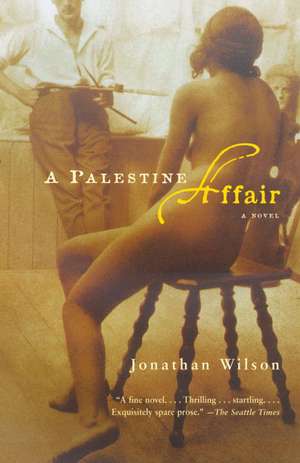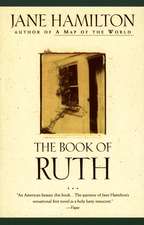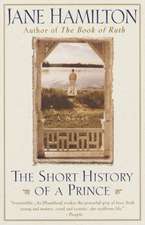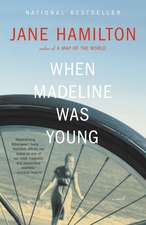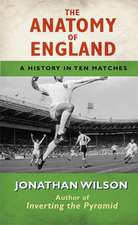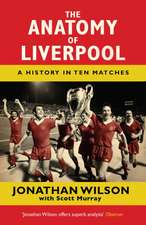A Palestine Affair
Autor Jonathan Wilsonen Limba Engleză Paperback – 30 iun 2004
Preț: 115.53 lei
Nou
Puncte Express: 173
Preț estimativ în valută:
22.11€ • 22.84$ • 18.40£
22.11€ • 22.84$ • 18.40£
Carte disponibilă
Livrare economică 04-18 martie
Preluare comenzi: 021 569.72.76
Specificații
ISBN-13: 9781400031221
ISBN-10: 1400031222
Pagini: 272
Dimensiuni: 132 x 204 x 15 mm
Greutate: 0.2 kg
Editura: Anchor Books
ISBN-10: 1400031222
Pagini: 272
Dimensiuni: 132 x 204 x 15 mm
Greutate: 0.2 kg
Editura: Anchor Books
Notă biografică
Jonathan Wilson was born in London in 1950 and educated at the universities of Essex, Oxford, and the Hebrew University of Jerusalem. He has lived in the United States since 1976, with a four-year interlude in Jerusalem. He is the author of two previous works of fiction, The Hiding Room and Schoom. His stories, articles, essays, and reviews have appeared frequently in The New Yorker, The New York Times Book Review, The Best American Short Stories, and elsewhere. He held a John Simon Guggenheim Fellowship in Fiction in 1994. He is chair of the English Department at Tufts University and lives in Newton, Massachusetts, with his wife and their two sons.
Extras
1. Bloomberg came out of the house in North Talpiot and bicycled toward the Arab village of Abu Tor. After ten minutes or so he dismounted and found a spot where the moonlight shone brightest on a stone wall. It was a clear night. He unstrapped his artist’s box and retrieved his pallete. Back in London Joyce had carefully, kindly numbered the tubes in white so that he would be able to continue to paint even when the light grew dim. He couldn’t love her anymore, although he wished that he could. His withdrawal from his wife was almost embarrassing—a man Bloomberg’s age shouldn’t be so damaged by the death of his mother. But he was. Late night at the London Hospital, the sky a sheet of midnight blue in the rain-streaked window beside her bed, and his mother, suddenly alert, recognizing him for the first time in weeks: “I will always remember you,” she’d said. But of course it was the other way round. It was Bloomberg who would always remember her: the immigrant boy’s mother ship and protector, the sails of her broad skirts and him cowering in the hold, gripping the cloth, his face pressed to the side of her leg. Meanwhile, as he mourned, Joyce continued to make small supportive gestures that made him feel sick inside. Her concern and consideration only highlighted his impoverishment of feeling. He was numb to her, and haunted. His mother wasn’t the only ghost. Her death had released the others. Six years on from the war’s end and here were his dead friends, appearing, like Banquo’s ghost, mutilated and bloody, whenever his head snapped into a dream or reverie: Jacob Rosen, his ripped face covered in tawny phlegm; Gideon Schiff, his sweet smile intact but not his body.
Bloomberg looked beyond the terraces across the dip and swell of the earth toward Siloam and the Mount of Olives, then set up his easel and canvas. As always before painting he executed detailed sketches of his surroundings. He sat on a rock and worked in his pad with charcoal and pencil. In the moon-flooded valley the olive trees were light gray, almost white.
After a while he heard footsteps on the goat path farther up the hillside and half turned toward the noise. Two Arab men walked side by side in animated conversation. Bloomberg watched them disappear round a curve of the serpentine path, then went back to work.
Twenty minutes must have passed before he heard more noise, this time from far down the terrace. Bloomberg got up from his work and peered between the trees. There was a flurry of activity a hundred and fifty yards below him, violent enough to stir up a small cloud of dust. He looked down and thought he made out two figures. Were they struggling? Making love? Bloomberg couldn’t tell. The blanched narrow frame of a tall man emerged in a shaft of moonlight. Whoever it was dusted himself off and disappeared down the terrace into an olive grove. Bloomberg heard him piss against a tree. His partner must have followed shortly after, but by then Bloomberg was engrossed in his work again and had forgotten about them.
After sketching he painted for two hours without a break before stopping for the night. He cycled home past a line of half-built houses, one hand placed firmly in the middle of his handlebars, the other holding the small canvas he had produced. The bike wheels crunched on the graveled pathway.
The doorway to his house was lit by two garden lanterns in glass containers. When he entered Joyce was sitting on the mattress. The larger of the two trunks they had brought lay half unpacked at her feet. Her hair was pulled back and she was wearing one of the long, inappropriate winter nightshirts she had brought from England. Her friend and mentor, Leo Cohn, had told her that the nights in Jerusalem were cold, even in summer.
Bloomberg offered Joyce a sprig of jasmine that he had plucked from the bush beside the gate.
“A visitor,” he said, “should always bring something, no matter how small.”
“You’re not exactly a visitor.”
He kissed her on the forehead. Nothing he said came out right. He had to let her go.
“What did you do?” Joyce continued.
“The village, the trees.”
Joyce lay back on one of two narrow beds that had been provided for them temporarily by Aubrey Harrison, the local representative from the Zionist organization in London that had brought them out here. It was warmer in the room than outside. A thin line of sweat trickled from beneath Joyce’s chin down the open neck of her shirt.
Bloomberg turned his canvas to the wall, leaning it carefully so that only the top edge touched. He kicked off his sandals.
“What they want,” he said, “the commission, I shan’t be able to do it.”
“Is it that difficult?”
Bloomberg produced his letter of instruction from his back pocket.
“ ‘A series of works depicting Life Under Reconstruction Conditions. Progress. Enterprise. Development.’ In other words, inspiring representations of Jewish pioneers. In other words, propaganda.”
“You’ll have the nights to yourself.”
“Hardly enough.”
She didn’t say anything but he sensed that she didn’t think it would hurt him to do work on behalf of somebody else. And in this case, he knew, she happened to believe strongly in the cause. But she had decided that for the moment the kindest thing would be to keep silent. It was more kindness on her part not to mention the money, the sixty pounds advanced to him by the Palestine Foundation Fund. Hardly enough for the milk and honey that he had promised her.
“Tea?” Bloomberg asked.
“I thought maybe something else.”
Joyce took a swig from the brandy bottle next to the bed, then sat up, pulled her nightshirt over her head and threw it behind her. She sat—bravely, Bloomberg thought—waiting for him to cross the room. It had been many weeks, maybe months, since they had made love. At first he didn’t move, but when she reached back to gather her nightshirt again the movement of her breasts excited him. He took three quick steps and grabbed her wrist.
“If not now, when? Isn’t that what the rabbis say?”
Bloomberg laughed, then bent his head and began to kiss her breasts.
After they were done (it was unsatisfying for her, he knew) Bloomberg got up and turned his painting around. It was still wet. He thought he’d got the moonlight on the rooftops rather well, but nothing else. He remembered the figures down the terrace and told Joyce that he had purposefully not sketched them in because he wasn’t interested in figures anymore.
“You’re a misanthropist,” she replied. “What were they doing?”
“Love, or a local argument. I wasn’t sure. They were a long way down.”
There was a faint smell of turpentine coming, oddly, from the outside in. Bloomberg walked naked to the door and took a couple of steps into the garden. The borders of their thin lawn were dotted with shrubs and rockrose. There was a scent of lavender and the turpentine smell, which seemed to emanate from a grove of pistachio oaks. Joyce came up behind him.
“Not exactly the Garden of Eden,” she said, encircling his waist with her arms and nuzzling her face into his back, “but it would be a shame if one of us were to get expelled. I love it here.”
He unhooked her arms from around him and stepped away.
A soft moaning that might have been prayer started in their ears and grew louder as a bloodied shape tore through the hedge, rushed at Bloomberg, held him in a hug and then crashed to the ground, trapping Bloomberg beneath. Joyce screamed, a long high note. Bloomberg shoved the weight off and rolled free. He was screaming himself and his entire body shook. The figure, a middle-aged man in Arab dress, twitched and grew still; his white djellaba was ripped and blood-soaked, so too the kaffiyeh pressed to his chest in a vain attempt to stanch the flow where blood poured from a knife wound above the heart. Joyce knelt down in the dampened grass. The dead, beaten face stared up at her open-eyed. She saw, to her surprise, pale skin, a full red beard, and the curled sidelocks of an Orthodox Jew. Bloomberg rose and stood over her. In the moonlight she could see his face, chest, arms, legs and limp penis stained in blood.
2. Saud, tall for his age, ran in long-legged strides down the hillside between the trees, breathless, tripping over rocks, caught from time to time in bursts of moonlight that felt to him like gunfire. Halfway down he stopped briefly in the shadows behind the Scottish church to strip off his bloodstained shirt, then he ran again, dropping the soaked ribbons of cloth behind him as in a paper chase. There was hardly anyone around—a young couple kissing under the globe of a locust tree, and far in the distance two mounted policemen trotting, mercifully, away from him. He reached the Old City and turned into its labyrinth of alleyways. Near the sesame-oil vats on Cush Street he thought he heard someone call his name. Saud increased his pace, although his lungs were bursting, and five minutes later he emerged through the Damascus Gate. His throat was dry and his heart beat so loudly he thought he might wake the neighborhood.
At the back of De Groot’s house on St. Paul Street he climbed the stairway and pushed the door. It was locked, but the half-open window in the wall gave him access. Once inside he moved quickly to the small lamplit desk behind the sofa. He sighed with relief. His leather case containing his books—his name dutifully inscribed on the flyleaves—was there on the rug where he had dropped it when they began their lesson. He held it under his arm, moved into the kitchen and poured himself a glass of water from the pitcher on the table. He took the glass with him when he left and, as he ran, smashed it into the stone wall, adding to the rubble at the side of the street.
Not far from the Dung Gate, Saud turned a corner, grabbed a rope, pushed his feet against a set of stone tiers and lowered himself to the bottom of a cistern. He stood shivering in an inch-thick layer of silt, his back pressed against the wall. The hircine stink in the air that he had sucked in while running was replaced by a cool dampness. He would have to wait until the suq was busy, then climb out and lose himself in the crowd.
Clouds banked like a semicircle of black hills above his head and obscured the moon. He crouched down and put his hands to his head. His hair was matted with blood and sweat; he forced his fingers through the clots, then wiped his hands on the scraps of shirt he still held. The knife plunged and De Groot, spurting blood, released him from their embrace; he was running through the trees with De Groot staggering in the opposite direction. At first he didn’t think that he was pursued, but then he heard a tumult of descent, heavy steps, shouts and, farther off, De Groot’s cries. By the time he got to the church, nimble and fast among the rocks and tall cypresses, he had lost whoever had started after him.
Moments before dawn, a woman with a jug on her hip leaned her face across the rim of the cistern and dipped her hand in hopeless expectation that she might touch water. Saud lay stretched out in the silt, one arm curled under his head as a pillow, the other stiff by his side. Her cry woke him and, startled, he rose, picked up his leather case, and grabbed the rope. The woman recoiled from the muddied gray figure rising toward her, and then Saud was out and running again like a madman through streets and curved stone stairways, up to the rampart walkway that Governor Ross had built, where, behind him, the light broke in thin wafers of pink over the city’s vaulted bazaars and cupolas.
Bloomberg looked beyond the terraces across the dip and swell of the earth toward Siloam and the Mount of Olives, then set up his easel and canvas. As always before painting he executed detailed sketches of his surroundings. He sat on a rock and worked in his pad with charcoal and pencil. In the moon-flooded valley the olive trees were light gray, almost white.
After a while he heard footsteps on the goat path farther up the hillside and half turned toward the noise. Two Arab men walked side by side in animated conversation. Bloomberg watched them disappear round a curve of the serpentine path, then went back to work.
Twenty minutes must have passed before he heard more noise, this time from far down the terrace. Bloomberg got up from his work and peered between the trees. There was a flurry of activity a hundred and fifty yards below him, violent enough to stir up a small cloud of dust. He looked down and thought he made out two figures. Were they struggling? Making love? Bloomberg couldn’t tell. The blanched narrow frame of a tall man emerged in a shaft of moonlight. Whoever it was dusted himself off and disappeared down the terrace into an olive grove. Bloomberg heard him piss against a tree. His partner must have followed shortly after, but by then Bloomberg was engrossed in his work again and had forgotten about them.
After sketching he painted for two hours without a break before stopping for the night. He cycled home past a line of half-built houses, one hand placed firmly in the middle of his handlebars, the other holding the small canvas he had produced. The bike wheels crunched on the graveled pathway.
The doorway to his house was lit by two garden lanterns in glass containers. When he entered Joyce was sitting on the mattress. The larger of the two trunks they had brought lay half unpacked at her feet. Her hair was pulled back and she was wearing one of the long, inappropriate winter nightshirts she had brought from England. Her friend and mentor, Leo Cohn, had told her that the nights in Jerusalem were cold, even in summer.
Bloomberg offered Joyce a sprig of jasmine that he had plucked from the bush beside the gate.
“A visitor,” he said, “should always bring something, no matter how small.”
“You’re not exactly a visitor.”
He kissed her on the forehead. Nothing he said came out right. He had to let her go.
“What did you do?” Joyce continued.
“The village, the trees.”
Joyce lay back on one of two narrow beds that had been provided for them temporarily by Aubrey Harrison, the local representative from the Zionist organization in London that had brought them out here. It was warmer in the room than outside. A thin line of sweat trickled from beneath Joyce’s chin down the open neck of her shirt.
Bloomberg turned his canvas to the wall, leaning it carefully so that only the top edge touched. He kicked off his sandals.
“What they want,” he said, “the commission, I shan’t be able to do it.”
“Is it that difficult?”
Bloomberg produced his letter of instruction from his back pocket.
“ ‘A series of works depicting Life Under Reconstruction Conditions. Progress. Enterprise. Development.’ In other words, inspiring representations of Jewish pioneers. In other words, propaganda.”
“You’ll have the nights to yourself.”
“Hardly enough.”
She didn’t say anything but he sensed that she didn’t think it would hurt him to do work on behalf of somebody else. And in this case, he knew, she happened to believe strongly in the cause. But she had decided that for the moment the kindest thing would be to keep silent. It was more kindness on her part not to mention the money, the sixty pounds advanced to him by the Palestine Foundation Fund. Hardly enough for the milk and honey that he had promised her.
“Tea?” Bloomberg asked.
“I thought maybe something else.”
Joyce took a swig from the brandy bottle next to the bed, then sat up, pulled her nightshirt over her head and threw it behind her. She sat—bravely, Bloomberg thought—waiting for him to cross the room. It had been many weeks, maybe months, since they had made love. At first he didn’t move, but when she reached back to gather her nightshirt again the movement of her breasts excited him. He took three quick steps and grabbed her wrist.
“If not now, when? Isn’t that what the rabbis say?”
Bloomberg laughed, then bent his head and began to kiss her breasts.
After they were done (it was unsatisfying for her, he knew) Bloomberg got up and turned his painting around. It was still wet. He thought he’d got the moonlight on the rooftops rather well, but nothing else. He remembered the figures down the terrace and told Joyce that he had purposefully not sketched them in because he wasn’t interested in figures anymore.
“You’re a misanthropist,” she replied. “What were they doing?”
“Love, or a local argument. I wasn’t sure. They were a long way down.”
There was a faint smell of turpentine coming, oddly, from the outside in. Bloomberg walked naked to the door and took a couple of steps into the garden. The borders of their thin lawn were dotted with shrubs and rockrose. There was a scent of lavender and the turpentine smell, which seemed to emanate from a grove of pistachio oaks. Joyce came up behind him.
“Not exactly the Garden of Eden,” she said, encircling his waist with her arms and nuzzling her face into his back, “but it would be a shame if one of us were to get expelled. I love it here.”
He unhooked her arms from around him and stepped away.
A soft moaning that might have been prayer started in their ears and grew louder as a bloodied shape tore through the hedge, rushed at Bloomberg, held him in a hug and then crashed to the ground, trapping Bloomberg beneath. Joyce screamed, a long high note. Bloomberg shoved the weight off and rolled free. He was screaming himself and his entire body shook. The figure, a middle-aged man in Arab dress, twitched and grew still; his white djellaba was ripped and blood-soaked, so too the kaffiyeh pressed to his chest in a vain attempt to stanch the flow where blood poured from a knife wound above the heart. Joyce knelt down in the dampened grass. The dead, beaten face stared up at her open-eyed. She saw, to her surprise, pale skin, a full red beard, and the curled sidelocks of an Orthodox Jew. Bloomberg rose and stood over her. In the moonlight she could see his face, chest, arms, legs and limp penis stained in blood.
2. Saud, tall for his age, ran in long-legged strides down the hillside between the trees, breathless, tripping over rocks, caught from time to time in bursts of moonlight that felt to him like gunfire. Halfway down he stopped briefly in the shadows behind the Scottish church to strip off his bloodstained shirt, then he ran again, dropping the soaked ribbons of cloth behind him as in a paper chase. There was hardly anyone around—a young couple kissing under the globe of a locust tree, and far in the distance two mounted policemen trotting, mercifully, away from him. He reached the Old City and turned into its labyrinth of alleyways. Near the sesame-oil vats on Cush Street he thought he heard someone call his name. Saud increased his pace, although his lungs were bursting, and five minutes later he emerged through the Damascus Gate. His throat was dry and his heart beat so loudly he thought he might wake the neighborhood.
At the back of De Groot’s house on St. Paul Street he climbed the stairway and pushed the door. It was locked, but the half-open window in the wall gave him access. Once inside he moved quickly to the small lamplit desk behind the sofa. He sighed with relief. His leather case containing his books—his name dutifully inscribed on the flyleaves—was there on the rug where he had dropped it when they began their lesson. He held it under his arm, moved into the kitchen and poured himself a glass of water from the pitcher on the table. He took the glass with him when he left and, as he ran, smashed it into the stone wall, adding to the rubble at the side of the street.
Not far from the Dung Gate, Saud turned a corner, grabbed a rope, pushed his feet against a set of stone tiers and lowered himself to the bottom of a cistern. He stood shivering in an inch-thick layer of silt, his back pressed against the wall. The hircine stink in the air that he had sucked in while running was replaced by a cool dampness. He would have to wait until the suq was busy, then climb out and lose himself in the crowd.
Clouds banked like a semicircle of black hills above his head and obscured the moon. He crouched down and put his hands to his head. His hair was matted with blood and sweat; he forced his fingers through the clots, then wiped his hands on the scraps of shirt he still held. The knife plunged and De Groot, spurting blood, released him from their embrace; he was running through the trees with De Groot staggering in the opposite direction. At first he didn’t think that he was pursued, but then he heard a tumult of descent, heavy steps, shouts and, farther off, De Groot’s cries. By the time he got to the church, nimble and fast among the rocks and tall cypresses, he had lost whoever had started after him.
Moments before dawn, a woman with a jug on her hip leaned her face across the rim of the cistern and dipped her hand in hopeless expectation that she might touch water. Saud lay stretched out in the silt, one arm curled under his head as a pillow, the other stiff by his side. Her cry woke him and, startled, he rose, picked up his leather case, and grabbed the rope. The woman recoiled from the muddied gray figure rising toward her, and then Saud was out and running again like a madman through streets and curved stone stairways, up to the rampart walkway that Governor Ross had built, where, behind him, the light broke in thin wafers of pink over the city’s vaulted bazaars and cupolas.
Recenzii
“Like the best of historical fiction, Wilson’s story is placed in an imagined past, but it is really happening right now. . . . You’re likely to stay up late reading.” —The Washington Post Book World
“A fine novel. . . . Thrilling . . . startling. . . . Exquisitely spare prose.” —The Seattle Times
“An engrossing, complex, and fearless tale of politics, arts, murder, sex, and history (personal and global) set in the rough and tumble that was Palestine in 1924.” —Anita Diamant, author of The Red Tent
“This rich novel . . . resonates with Hemingway’s harrowing work after World War I.” —The Christian Science Monitor
“A Palestine Affair is hard to put down. . . . [It] echoes its modernist predecessors: Forster’s A Passage to India, Conrad’s The Secret Agent, and James’s The Princess Casamassima.” —San Francisco Chronicle
“A story that tautens the sinuous strands of [the] period into a lethal knot.” —The New York Times Book Review
“A swift little mystery-romance. . . . Crisply written. . . . Wonderfully rich in period detail and atmosphere and wonderfuly free of polemic, side taking, or blame.” —Seattle Weekly
“Wilson is a talented writer with a gift for story, scene, and character.” —The Boston Globe
“Profoundly memorable. . . . Haunting. . . . A Palestine Affair is romantic, but darkly so, in the manner of The English Patient. . . . Wilson poetically evokes every aspect of Israel’s scenery.” —The Jerusalem Report
“Worth reading? An Englishman might say: ‘Rather.’ An American would put it differently: ‘You bet it is!’ ” —Saul Bellow
“Well-plotted, this is a dark, romantic thriller whose author has an amazingly keen eye for the landscapes his characters get lost in.” —Detroit Free Press
“Tightly knit. . . . Wilson is exceptionally attuned to the range of opinion and complex sense of identity of the Jews living in Palestine, as well as the subtle but potentially explosive tension that characterizes everyday interactions under colonial occupation.” —Publishers Weekly, starred review
“Savvy. . . . Edgy. . . . Wilson excels at creating the atmosphere surrounding his story. He wears his research lightly but tellingly.” —The Jerusalem Post
“A Palestine Affair evokes, quite tangibly, the days of the Mandate. This is a true and touching act of the imagination. The book’s very sexy, a nostalgic and provocative envisioning of that time. I recommend it highly.” —David Mamet
“Gripping. . . . [A] moody, darkly romantic thriller with a haunting sense of place. . . . Wilson has always been a perceptive writer worth reading. . . . He has a grasp of period detail as deft and compelling as Alan Furst’s. . . . [A] deft portrait of 1920s Jerusalem and its diverse, bickering inhabitants.” —Forward
“Enchanting. . . . Wilson has populated his captivating novel with memorable characters. . . . It is a compelling and powerful story of love and politics.” —Abilene Reporter-News
“Cinematic. . . . Artfully written. . . . Intricate, closely stitched. . . . Wilson is a novelist with an eye for rich historical detail. . . . His writing is highly visual and tactile, with a painterly quality.” —The Jewish Week
“How rare to read a novel that moves with the velocity of a thriller and that is, at the same time, so splendidly written. The characters glow with persuasive life, and Wilson exquisitely evokes the land itself as it seethed under British rule—a place stamped by history but unformed, too; an older world that seems younger because of all the possibility in it. Wilson’s story of love and betrayal merges historical, political, and private passions to create a beautiful and timeless tale.” —Jonathan Rosen, author of The Talmud and the Internet
“Excellent and atmospheric. . . . It brings to life the fascinating complexities of the Land of Israel at one of the many significant junctures in its history.” —New Jersey Jewish News
“A fine novel. . . . Thrilling . . . startling. . . . Exquisitely spare prose.” —The Seattle Times
“An engrossing, complex, and fearless tale of politics, arts, murder, sex, and history (personal and global) set in the rough and tumble that was Palestine in 1924.” —Anita Diamant, author of The Red Tent
“This rich novel . . . resonates with Hemingway’s harrowing work after World War I.” —The Christian Science Monitor
“A Palestine Affair is hard to put down. . . . [It] echoes its modernist predecessors: Forster’s A Passage to India, Conrad’s The Secret Agent, and James’s The Princess Casamassima.” —San Francisco Chronicle
“A story that tautens the sinuous strands of [the] period into a lethal knot.” —The New York Times Book Review
“A swift little mystery-romance. . . . Crisply written. . . . Wonderfully rich in period detail and atmosphere and wonderfuly free of polemic, side taking, or blame.” —Seattle Weekly
“Wilson is a talented writer with a gift for story, scene, and character.” —The Boston Globe
“Profoundly memorable. . . . Haunting. . . . A Palestine Affair is romantic, but darkly so, in the manner of The English Patient. . . . Wilson poetically evokes every aspect of Israel’s scenery.” —The Jerusalem Report
“Worth reading? An Englishman might say: ‘Rather.’ An American would put it differently: ‘You bet it is!’ ” —Saul Bellow
“Well-plotted, this is a dark, romantic thriller whose author has an amazingly keen eye for the landscapes his characters get lost in.” —Detroit Free Press
“Tightly knit. . . . Wilson is exceptionally attuned to the range of opinion and complex sense of identity of the Jews living in Palestine, as well as the subtle but potentially explosive tension that characterizes everyday interactions under colonial occupation.” —Publishers Weekly, starred review
“Savvy. . . . Edgy. . . . Wilson excels at creating the atmosphere surrounding his story. He wears his research lightly but tellingly.” —The Jerusalem Post
“A Palestine Affair evokes, quite tangibly, the days of the Mandate. This is a true and touching act of the imagination. The book’s very sexy, a nostalgic and provocative envisioning of that time. I recommend it highly.” —David Mamet
“Gripping. . . . [A] moody, darkly romantic thriller with a haunting sense of place. . . . Wilson has always been a perceptive writer worth reading. . . . He has a grasp of period detail as deft and compelling as Alan Furst’s. . . . [A] deft portrait of 1920s Jerusalem and its diverse, bickering inhabitants.” —Forward
“Enchanting. . . . Wilson has populated his captivating novel with memorable characters. . . . It is a compelling and powerful story of love and politics.” —Abilene Reporter-News
“Cinematic. . . . Artfully written. . . . Intricate, closely stitched. . . . Wilson is a novelist with an eye for rich historical detail. . . . His writing is highly visual and tactile, with a painterly quality.” —The Jewish Week
“How rare to read a novel that moves with the velocity of a thriller and that is, at the same time, so splendidly written. The characters glow with persuasive life, and Wilson exquisitely evokes the land itself as it seethed under British rule—a place stamped by history but unformed, too; an older world that seems younger because of all the possibility in it. Wilson’s story of love and betrayal merges historical, political, and private passions to create a beautiful and timeless tale.” —Jonathan Rosen, author of The Talmud and the Internet
“Excellent and atmospheric. . . . It brings to life the fascinating complexities of the Land of Israel at one of the many significant junctures in its history.” —New Jersey Jewish News
Descriere
This swift and sensual novel of passion and politics transports readers to 1924 British Palestine, where the Arabs, the British, and the Jews mingle in a scene of colonial excess and unease.
